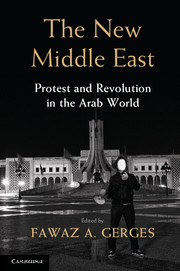Book contents
- Frontmatter
- Contents
- List of Figures and Tables
- Contributors
- Acknowledgments
- 1 Introduction
- Part I Context and Causes
- Part II Thematic and Comparative Aspects
- Part III Countries in Turmoil
- Part IV Regional and International Implications
- 16 Saudi Internal Dilemmas and Regional Responses to the Arab Uprisings
- 17 Israel, Palestine, and the Arab Uprisings
- 18 Turkey and Iran in the Era of the Arab Uprisings
- 19 U.S. Policy and the Arab Revolutions of 2011
- 20 Europe and the Arab Uprisings
- 21 Conclusion
- Selected Bibliography
- Index
- References
18 - Turkey and Iran in the Era of the Arab Uprisings
Published online by Cambridge University Press: 05 June 2014
- Frontmatter
- Contents
- List of Figures and Tables
- Contributors
- Acknowledgments
- 1 Introduction
- Part I Context and Causes
- Part II Thematic and Comparative Aspects
- Part III Countries in Turmoil
- Part IV Regional and International Implications
- 16 Saudi Internal Dilemmas and Regional Responses to the Arab Uprisings
- 17 Israel, Palestine, and the Arab Uprisings
- 18 Turkey and Iran in the Era of the Arab Uprisings
- 19 U.S. Policy and the Arab Revolutions of 2011
- 20 Europe and the Arab Uprisings
- 21 Conclusion
- Selected Bibliography
- Index
- References
Summary
Abstract
This chapter argues that the Arab uprisings will constitute a long, drawn-out process that will leave the major Arab powers, with the partial exception of Saudi Arabia, preoccupied with issues of domestic order for years, if not decades. Major Arab countries such as Egypt will, therefore, be unable to play any major role in the regional politics of the Middle East. This will create the space for the two major non-Arab powers, Turkey and Iran, which already possess considerable hard and soft power, to dominate the political landscape in the region. Consequently, in the short to medium term, the course of regional politics will be determined by the policies adopted by Ankara and Tehran and the bilateral relations between them. It acknowledges that currently there are visible strains in the Turkey-Iran relationship, caused principally by their opposing stands on Syria. However, it concludes that policy makers in Turkey and Iran will not allow their relationship to deteriorate to the point of open conflict because they share several common interests that include, in addition to a booming trade in oil and gas, protecting the integrity of Iraq, curbing Israel’s aggressive proclivities, and minimizing the intervention of non-regional powers in the Middle East.
- Type
- Chapter
- Information
- The New Middle EastProtest and Revolution in the Arab World, pp. 402 - 417Publisher: Cambridge University PressPrint publication year: 2013
References
- 13
- Cited by



